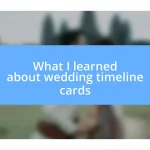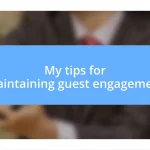Key takeaways:
- Timely RSVPs are crucial for effective event planning, ensuring hosts can prepare appropriately and enhancing the overall experience for attendees.
- Common RSVP challenges include procrastination, miscommunication, and forgetfulness, which can be mitigated through clear communication and setting firm deadlines.
- Utilizing technology for RSVPs, such as apps and social media, simplifies the process and fosters excitement, while follow-up strategies nurture engagement and inclusivity.

Understanding RSVP Importance
RSVPs are more than just a formality; they’re essential for planning. I remember hosting a gathering where, despite my efforts to track responses, only a handful replied, leaving me guessing how much food to prepare. Have you ever been in a situation where you over-prepared for guests who didn’t show? It’s both frustrating and a bit disheartening.
Understanding the importance of RSVP deadlines can save us from those awkward scenarios. When people respond in a timely manner, it builds a sense of respect among hosts and guests. I once attended a wedding where the timely responses allowed the couple to create a beautiful seating arrangement, and the atmosphere felt so much warmer—like they were truly celebrating with friends.
Moreover, RSVPs help set expectations. Imagine brewing excitement for an event only to discover, last minute, that half the people you were counting on couldn’t make it. It feels a bit like shooting for the stars and landing on the moon—a little less thrilling than you had envisioned. Do you see how a simple RSVP can transform not just logistics, but the entire experience of an event?

Common RSVP Challenges
RSVP challenges often arise from misunderstanding or neglecting the deadline itself. I recall hosting a baby shower and setting a clear deadline for responses. However, many guests procrastinated, leading to a chaotic final week. It was a balancing act between confirming the headcount and trusting that people would eventually come through. This experience reminded me how crucial effective communication is in ensuring that everyone is on the same page.
Here are some common RSVP challenges that I have observed:
- Procrastination: Guests often delay responses until the last minute, leaving hosts scrambling for final counts.
- Miscommunication: Sometimes, invitations aren’t clear about the deadline, resulting in confusion.
- Overcommitment: Friends want to attend but can’t commit early due to conflicting schedules, complicating plans.
- Forgetfulness: Some simply forget to RSVP, which leaves hosts guessing and unprepared.

Setting Effective RSVP Deadlines
Setting a clear RSVP deadline is critical to effective event planning. Personally, I’ve found that setting a deadline at least two weeks before the event works wonders. It gives guests ample time to respond while allowing me to finalize plans without feeling rushed. Have you ever felt that pressure as the date approaches? I remember a friend’s dinner party where the ambiguous deadline led to a wave of last-minute responses. It felt chaotic, and I really wished I had established a firmer timeline earlier.
In my experience, it’s also helpful to communicate the reason behind the deadline. When guests understand the importance of their timely response—like accommodating a specific meal prep or an intricate seating arrangement—they tend to take it more seriously. I often share with invitees the logistics involved, which makes them more mindful. Once, I included a note about how their responses directly affected catering costs, and the difference was noticeable! Guests appreciated knowing they had a role in the planning.
Establishing various deadline tiers can further streamline the process. For example, having an “early bird” response option encourages prompt replies and offers the chance for guests to enjoy special perks, like a preferred dish choice. This strategy not only motivates attendees but also creates excitement around the event. I once tried this for a birthday bash and saw an impressive number of early confirmations, making the planning process feel so much smoother and more enjoyable.
| Strategy | Description |
|---|---|
| Two-Week Minimum | Gives guests enough time while protecting the host’s schedule. |
| Communicate Importance | Helps guests understand the impact of their timely responses. |
| Tiered Deadlines | Encourages early responses with special perks. |

Encouraging Timely Responses
When it comes to encouraging timely responses, I’ve found that setting expectations right from the start is key. I once sent out invitations for a small gathering, and alongside the RSVP request, I included a friendly reminder about how my planning depended on their input. It dawned on me how much people appreciate clarity—all it takes is a simple nudge to remind them that their response truly makes a difference.
Creating a sense of urgency can also be effective. During a wedding I co-planned, I highlighted the limited capacity of our venue in the invitation. This subtle pressure not only prompted quicker responses but also instilled a sense of excitement. I remember guests smiling as they replied, feeling like they were part of something exclusive; it’s these little tactics that can change the game drastically.
I try to engage guests by personalizing the RSVP process. For instance, I often include a short sentence inviting guests to share something they’re looking forward to during the event. This simple addition creates a dialogue and makes them feel more connected. When I recently planned a casual potluck, several guests used their replies to ask about dishes they could bring, and it transformed the atmosphere from a simple “yes” or “no” into an eager anticipation for the event. Isn’t it great when RSVP responses become the start of the party conversations?

Utilizing Technology for RSVPs
Utilizing apps and online platforms for RSVPs has truly revolutionized how I handle event planning. I remember using an event management tool for a family reunion. It allowed guests to RSVP with a simple click on their smartphones, and I immediately knew the headcount. This technology not only simplifies the process but also makes it easier for people to respond promptly. Have you noticed how much more convenient it is to RSVP digitally?
Social media platforms are also a fantastic way to engage invitees. I once created a private Facebook event for a friend’s birthday, and it sparked lively discussions right away. Guests could share their excitement in the comments, and those interactions stirred up a buzz that was palpable. Plus, reminders popped up as the date approached, which kept the deadline fresh in everyone’s mind. It’s fascinating how technology fosters a sense of community and anticipation.
Moreover, integrating RSVP options into website landing pages can be incredibly impactful. I designed a simple event webpage for a charity fundraiser last year, where attendees could RSVP directly. The ease of it drew in a larger crowd and helped me track responses effectively. I think this approach not only adds a professional touch but also aligns with today’s fast-paced expectations. In what ways have you utilized technology to enhance your events?

Follow Up Strategies for RSVPs
Following up on RSVPs can be an art form that really elevates the planning process. One technique I often use is sending a gentle reminder a week before the deadline. I recall a birthday party I planned last year; I crafted a cheerful message reminding everyone to respond by the weekend. It was amazing how many replies came pouring in after that! It just shows how a touch of kindness can prompt action without being pushy.
For those who haven’t responded even after the deadline, I find a personal reach-out can make a huge difference. I remember reaching out to a close friend who hadn’t RSVP’d for my engagement party. A quick text asking if they’d be able to join me genuinely made them feel like they mattered, and they promptly confirmed. It’s those small, warm reminders that can bring guests back to the table—literally!
Another effective strategy is to follow up with those who did RSVP, crafting a sense of inclusion. After receiving confirmations for my last event, I sent a light-hearted message inviting attendees to share their favorite memories with me. It sparked a flood of responses filled with laughter and nostalgia, setting the stage for a vibrant gathering. Isn’t it fascinating how these follow-up strategies can transform a standard event into a shared celebration?

Evaluating RSVP Success
When I reflect on RSVP success, I see the importance of measuring engagement levels. For a recent wedding I attended, I noticed that about 80% of guests RSVP’d on time, which was a delightful surprise! This timely response allowed the couple to make informed decisions about seating and catering. It makes me wonder—do you track engagement differently based on the event type?
One telling sign of RSVP effectiveness is the level of communication that follows the initial invitation. I once organized a small gathering and received several messages asking for clarifications long after the invites were sent. This response indicates that people are genuinely interested but may need more information to commit. Was it my fault for not providing enough details upfront? Learning from that experience, I now strive for clarity in my invitations, ensuring that all necessary information is easily accessible.
Finally, I like to gauge post-event feedback as a measure of RSVP strategy success. After hosting a dinner party, I followed up with attendees to hear their thoughts on the event. The responses were overwhelmingly positive, and many expressed appreciation for timely communication. Reflecting on that, I find it’s a great reminder that RSVPs don’t just mark attendance; they create an opportunity for meaningful connections. How do you feel about receiving feedback after an event?













